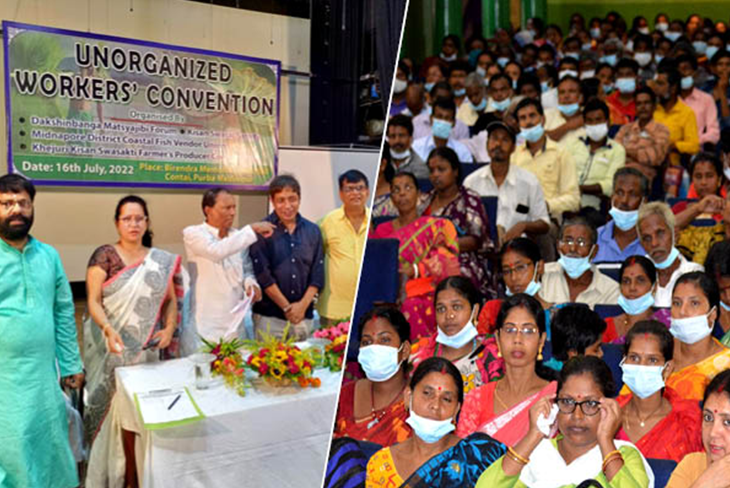The worsening climate crisis and swelling pollution levels are leading to increased severity and frequency of extreme weather events. Consequently, newer forms of vulnerabilities are disrupting people’s lives and livelihoods. Marginalised communities are impacted the most by climate change despite being the least responsible for it. This includes labouring populations who live in informal settlements and depend on natural water bodies and rainfall for their livelihood.
We organised a convention on July 16, 2022, in East Medinipur, West Bengal, to discuss the issues faced by agricultural farmers and fish workers in the context of the ongoing climate crisis. We hoped to prepare a plan of action for the future, together with other civil society organisations working with these sectoral workers. Besides farmers and fisherfolk, over 1,000 participants at the meeting included Mahatma Gandhi National Rural Employment Guarantee Act (MGNREGA) workers, domestic workers and home-based workers. Sh. Akhil Giri, Honourable Minister in Charge, Department of Fisheries, West Bengal, graced the occasion.
The convention provided a platform for workers’ collectives from different sectors to unite and initiate conversations on the diverse issues induced by climate change. They also discussed the urgent need for climate-responsive policies and practices and presented their suggestions for a climate-just future.
Participants expressed a strong need to provide space and opportunities for workers’ collectives and networks to voice their views and provide inputs on the various central and state-level policies to mitigate the impact of climate change. A key recommendation emerging at the convention included estimating the effects of the climate crisis on people dependent on the informal economy in terms of their work, health, income and expenditure. This assessment would help develop a fair compensation framework for them. At the meeting, participants suggested the government introduce a climate tax and levy the same on the primary contributors to climate change. This pool of resources would ensure that vulnerable workers could be duly compensated.
As we strive towards a just transition to greener alternatives and a more equitable and sustainable economy, we must protect workers’ rights and promote decent work. While doing so, it is also imperative to strengthen the climate resilience of vulnerable communities and to enable their needful adaptation.

